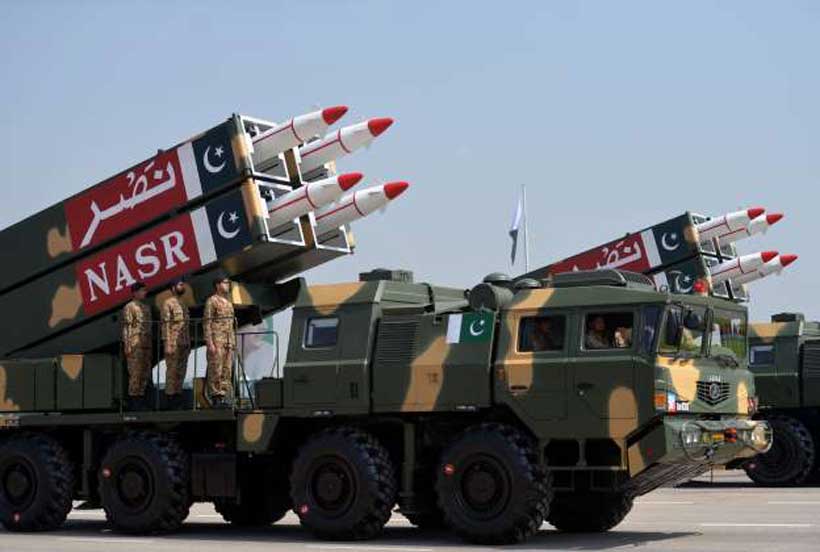Pakistan army announced on 24 January a successful training of its short-range ballistic missile, “Nasr”, which is believed to have a range of just 60 kilometres. The 60-kilometre range Nasr missile as “a high precision, shoot and scoot Weapon System with the ability of in-flight maneuverability. The missile is able to defeat the ballistic missile defence being developed by India. The missile can carry both conventional and nuclear warheads, but it is known more for its capability to carry nuclear warheads of suitable yield. Nasr is launched from a multi-tube launcher, capable of launching four successive missiles. It is considered as the high-precision weapon system that can be prepared for launch in a short time.
Nasr was introduced in April 2011, developed in response to India’s Cold Start doctrine, the existence of which was officially confirmed by Indian Army Chief Gen Bipin Rawat. The tactical nuclear weapon system, it is said, is meant to deny space to India for conventional conflict below the nuclear threshold.
In fact, the NASR has been developed as the Pakistan army of last resort against Indian Cold Start Doctrine. According to the former head of the Strategic Plan Division (SPD) Retd Lt General Kidwai, the nuclear weapons would be only used “if the very existence of Pakistan as a state is at stake.” The sole aim of the nuclear weapons is to deter Indian aggression. He also stated that Indian CSD is an offensive limited war strategy designed to seize Pakistan’s territory swiftly, hence, the developments of TNWs have sufficiently blocked the avenues for serious military operation from the Indian military side. The Nasr can carry a small-yield “sub-kilotonne” nuclear weapon not to designed widespread damage. It has been designed to protect the Pakistan’s national interest and to provoke international intervention to stop India from designing hawkish policies.
Pakistan’s use of tactical nuclear weapon would aim to minimize the destruction and to avoid the provoking a massive Indian retaliation which New Dehli nuclear doctrine mandates. According to many Analysts Pakistan is unlikely to use the Nasr on Indian territory, but, it would used against the Indian forces deep inside Pakistan territory.
Pakistan does not believe in the arms race, the development of short range missile is part of Pakistan’s security policy because India has supremacy in conventional force and it spends more money than Pakistan on its military force modernization. For instance, India tested a long-range nuclear-capable missile on 14 January from an island in the Bay of Bengal. According to the Indian defence ministry the Agni-5 intercontinental ballistic missile, was made from a mobile launcher, and “further strengthens indian credible deterrence”. While, the increase in the military capability of India always intensifies the security dilemma of Pakistan thus, it opposed India’s cruise and ballistic missiles’ development because, its short and long range weapons undermine Pakistan’s security. India has been developing outstanding military strike capabilities to showcase itself as a regional hegemon in South Asia and great power in the world. Nonetheless, it has not changed the strategic relationship between Pakistan and India (according to the prominent nuclear expert Dr. Jaspal ) but, it amplified the arms race in the region.
Dr. Jaspal states that the NASR is a cost-effective way (due to Pakistan’s resource constraints), to alleviate the rapidly growing conventional asymmetries between India and Pakistan and to counter the threat of limited war. In a nutshell, Nasr has poured cold water on India’s Cold Start Doctrine and this weapon system has augmented full spectrum deterrence posture while, remaining within the precincts of the policy of credible minimum deterrence, against prevailing and evolving threat spectrum more effectively including India’s ballistic missile defense and other air defense systems.


